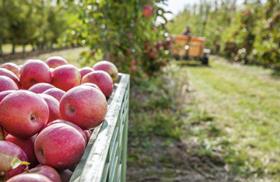
This season has proved a success for Pink Lady with a harvest of 202,000 tonnes of Pink Lady and PinKids apples, marking an increase of 27 per cent compared with the previous season.
An estimated 5,750 tonnes of Pink Lady and PinKids apples have reportedly been sold weekly, representing growth of 50 per cent compared with 2019/20 and 8 per cent compared with 2018/19.
The first half of the season has also been supported by a considerable amount of promotion. A brand-new 360 communication campaign in 12 European countries, conducted on TV, social media and in the press, highlights the company’s corporate and brand values.
In terms of sales, the UK saw the biggest year-on-year growth in Pink Lady volumes, rising 37 per cent (by 10,200 tonnes). Germany saw growth of 27 per cent (or 10,300 tonnes), while French sales rose 14 per cent (3,350 tonnes).
Pink Lady this year launched its new communication platform, “What can Pink Lady do for youtoday?”, aiming to position Pink Lady as a positive brand that chimes with consumer expectations on economic, environmental and social issues. The platform integrates these pillars of sustainable development and the four axes of commitment: preservation of the environment, progress for producers, development of growing areas and relations with consumers.
“In every step of the production process of a Pink Lady apple, we strive to do this in the most sustainable way possible,” says corporate communications manager Julia Savin. “Our objective is to keep working and developing the means to make Pink Lady a 100 per cent sustainable brand, to guarantee tastes and to promote our responsible commitments. To make that happen, the Pink Lab supports research and development to offer new solutions that will guarantee an even more sustainable production, which respects the environment.”
Pink Lady commitments
- Preservation of environment: develop agro-ecological practices, preserve natural resources, get rid of single-use plastic, move towards a carbon neutral industry by 2030
- Progress for producers: fair remuneration, improvement in working environment, support research and innovation for sustainable production, fight waste
- Development of growing areas: maintain jobs, ensure renewal of generations, facilitate relations between producers and local residents
- Relations with consumers: guarantee a safe, natural and quality product, optimise traceability information, increase meetings between producers and consumers



